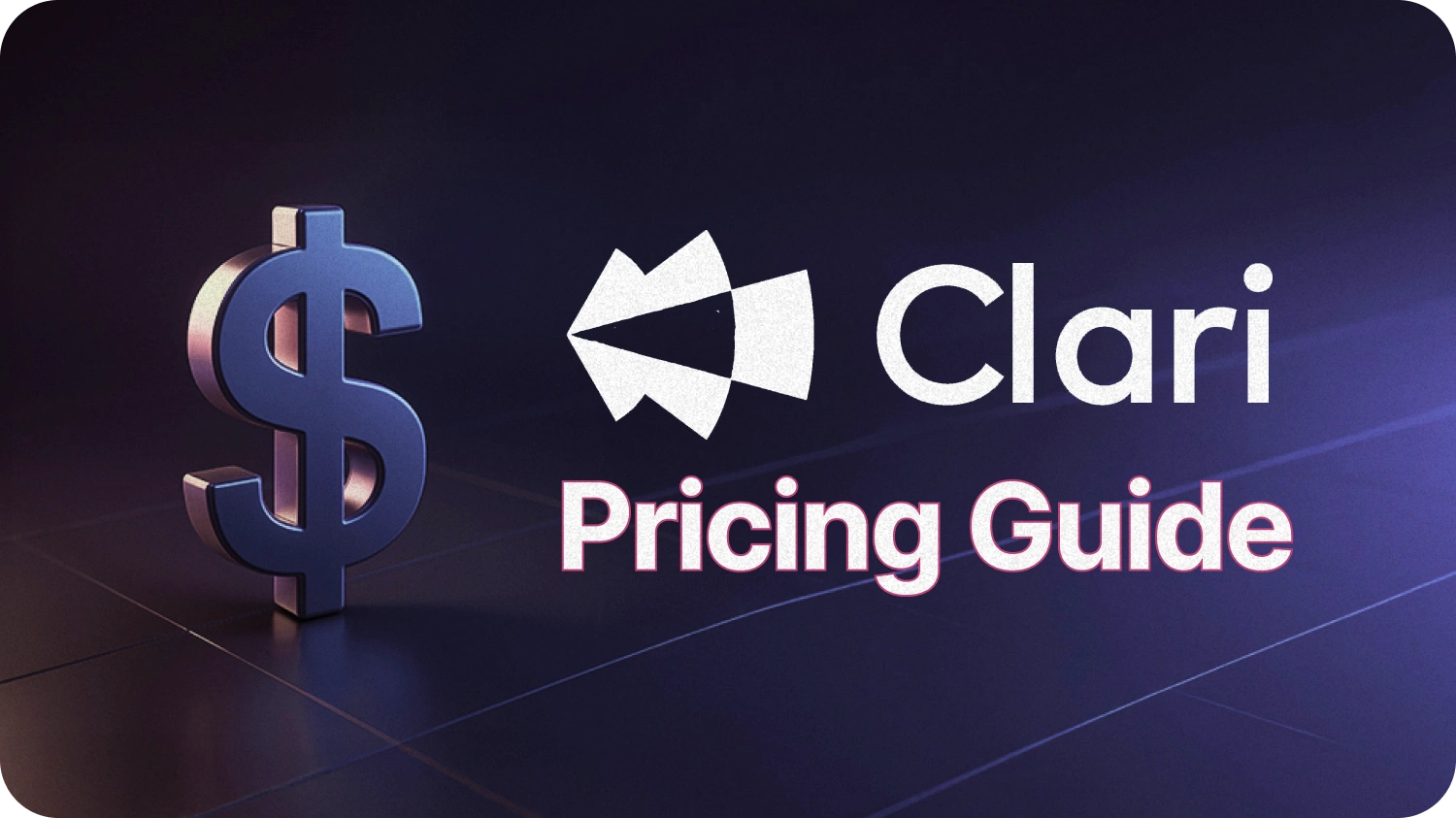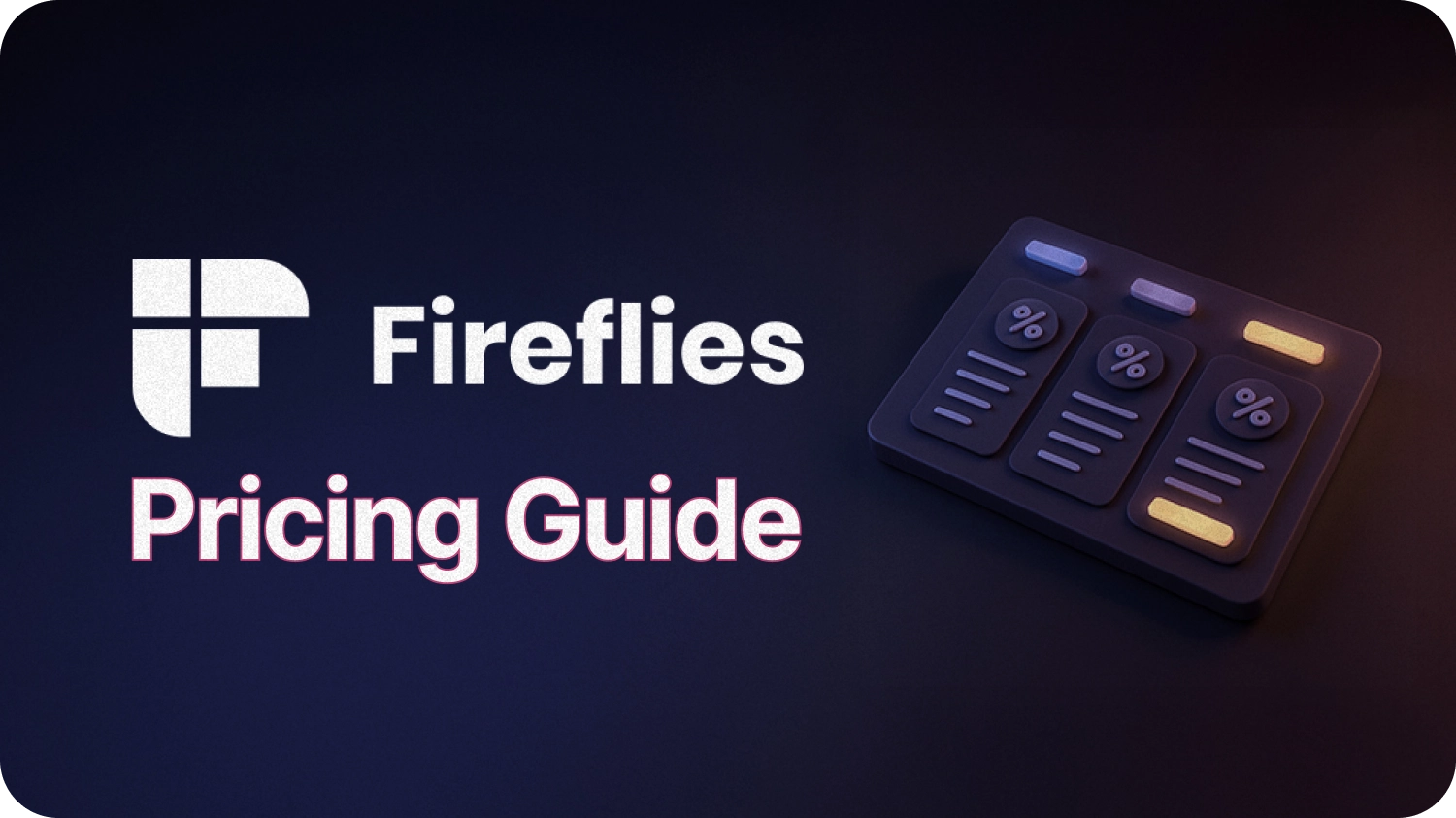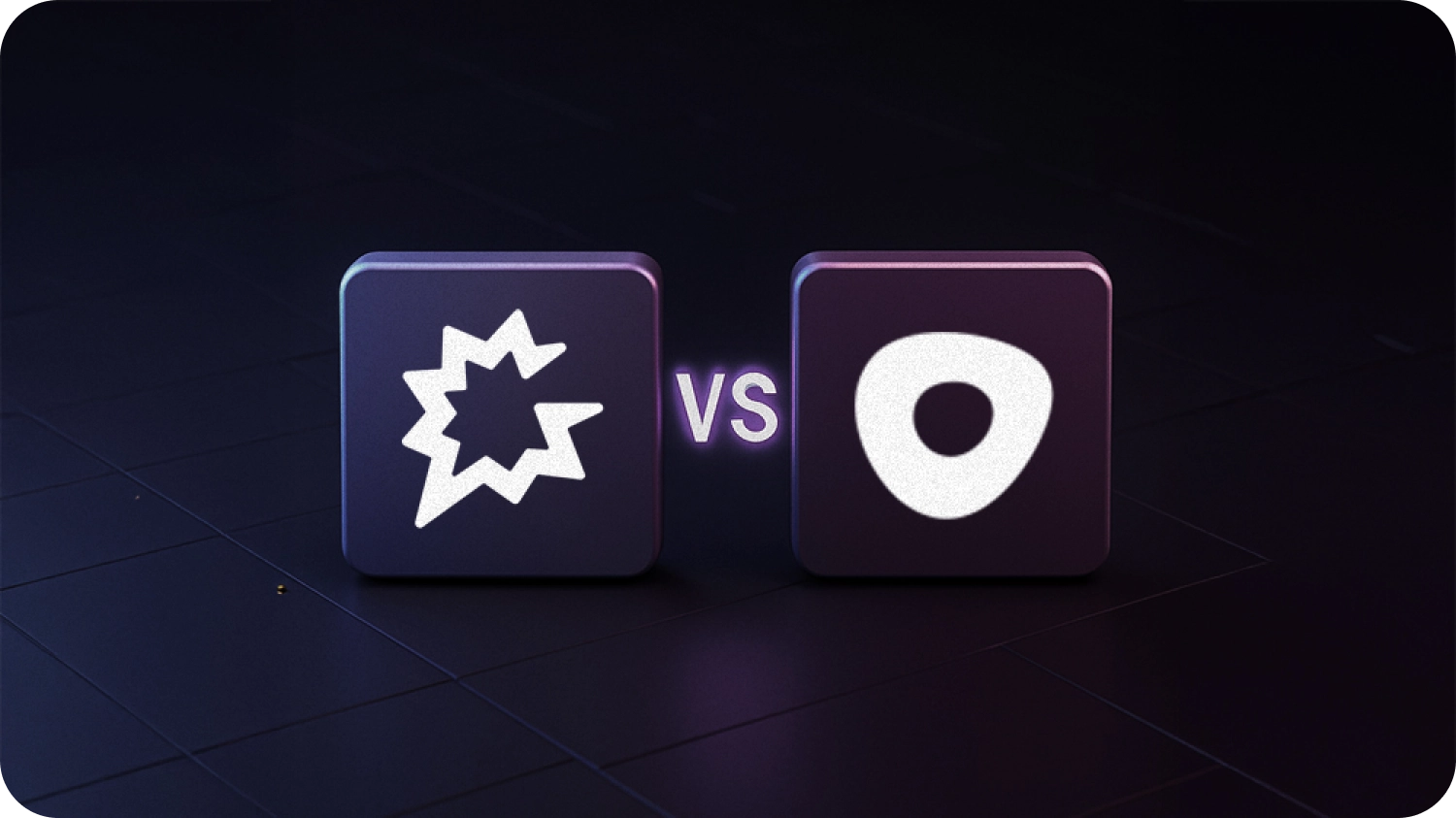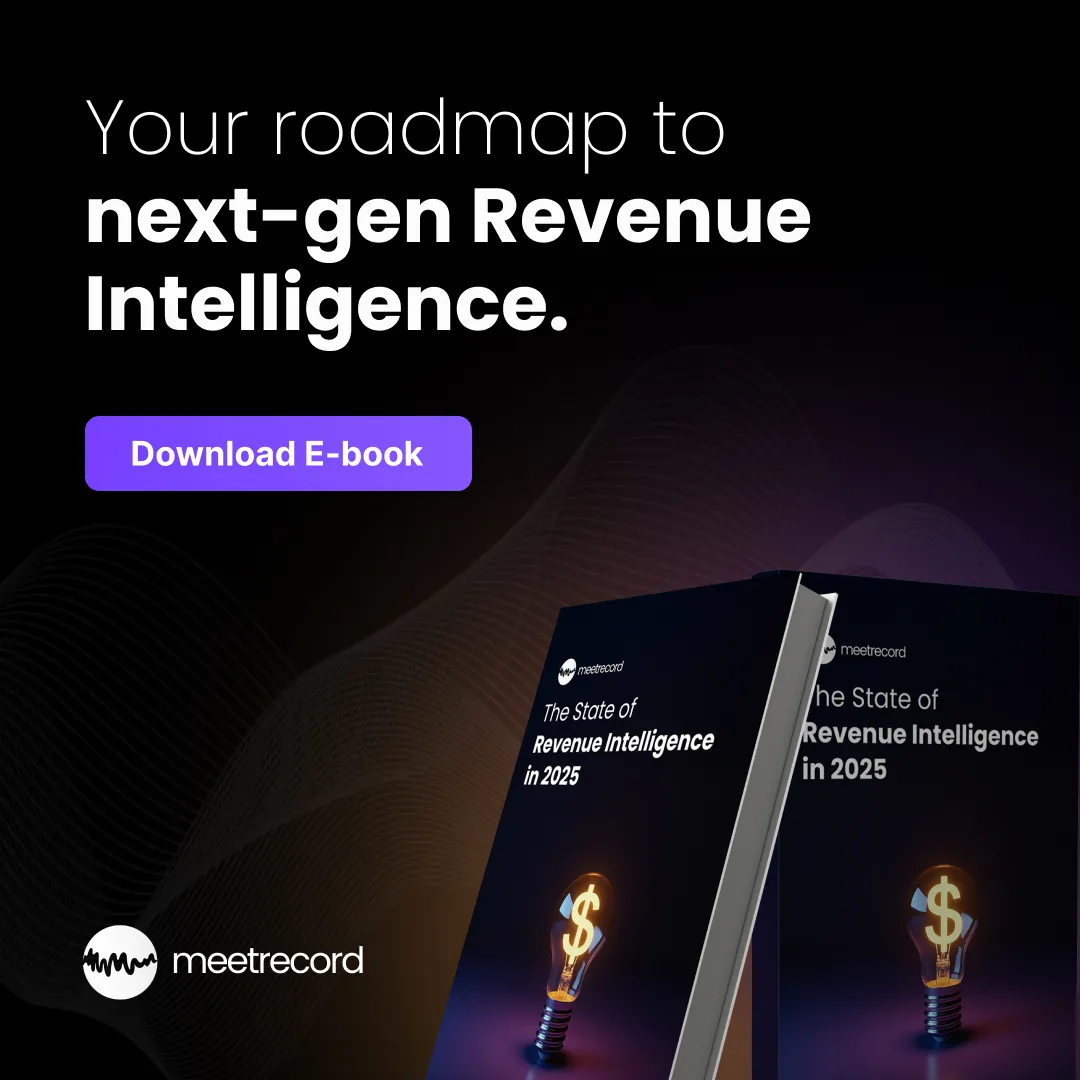Looking for the best Avoma alternatives for your sales team?
Whether you’ve outgrown Avoma or need features it doesn’t offer, like deeper sales coaching, pipeline insights, or a better user experience, this guide is built to help you choose the right tool.
We’ll compare Avoma to top alternatives like MeetRecord, Gong.io, Clari Copilot, Fireflies.ai, Otter.ai, Fellow.app, among others, across pricing, features, and use cases so you can make the most informed decision.
What is Avoma?
Avoma is actually an acronym for “A Very Organized Meeting Assistant." It’s an AI meeting assistant and note-taking tool that caters to the needs of multiple business teams within a company.
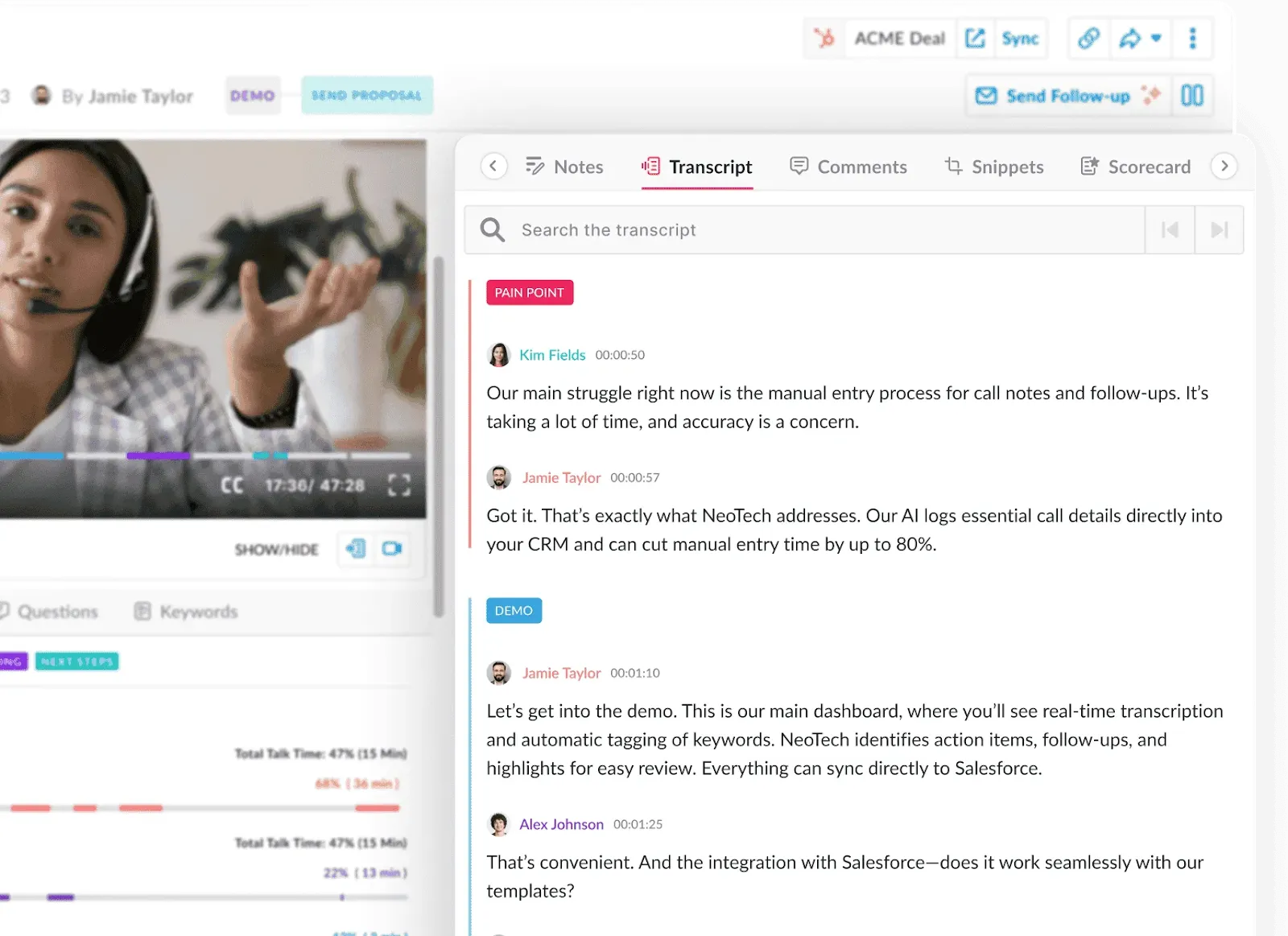
As a sales rep, you can use Avoma to take better notes from all customer calls; as a recruiter, to record interview calls; and as a product manager to capture and store customer interviews.
As a meeting assistant tool, it’s useful for both internal and external meetings. The tool helps you run meetings smoothly and adds value throughout the entire lifecycle.
It currently holds a 4.6 out of 5 rating on G2, indicating generally positive reviews.
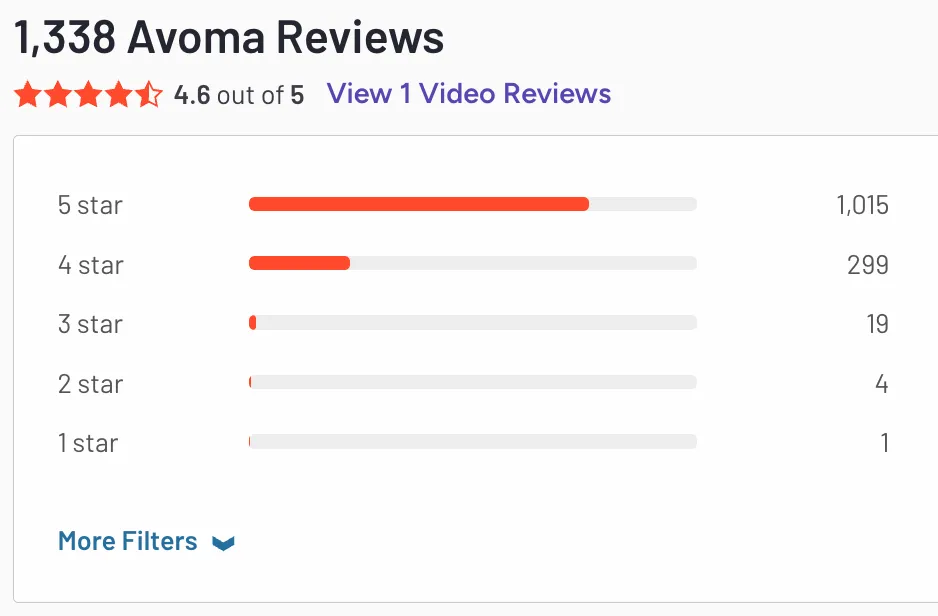
What Avoma Offers
Avoma’s meeting assistant software helps you get organized, be productive, collaborate with other teams, and get conversational intelligence from meetings and calls.
To summarize, the benefits of a meeting assistant software like Avoma come down to:
- Time savings – with easy-to-navigate call transcripts
- Meeting highlights and summaries
- A centralized call repository
- Overall improvement in meeting experience
Avoma offers a 14-day free trial, and its paid plans start at about $19 per user per month. It’s a relatively affordable tool compared to enterprise-focused tools like Gong or Clari, which we will compare in detail later.
3 Reasons Companies Look for Avoma Alternatives
While Avoma has plenty to offer, many companies eventually hit a ceiling. And that’s when they start searching for smarter, more specialized alternatives.
Here’s why growing sales teams eventually move beyond Avoma:
1. Not Built for Revenue Teams
Avoma has an offering for all teams in the company, and it is a good tool if you are looking for company-wide implementation.
But Avoma is primarily an AI-powered meeting assistant tool, not a dedicated sales platform. It doesn’t offer many of the advanced features that specialized revenue intelligence and sales acceleration platforms provide to sales teams.
In contrast, tools like Gong and MeetRecord focus on revenue teams, an area where Avoma lacks focus.
2. User Experience
A lot of customers on G2 question the tool’s utility when they need it. Common issues include the bot not joining meetings initially, or speakers not being identified even after a voice signature is given.
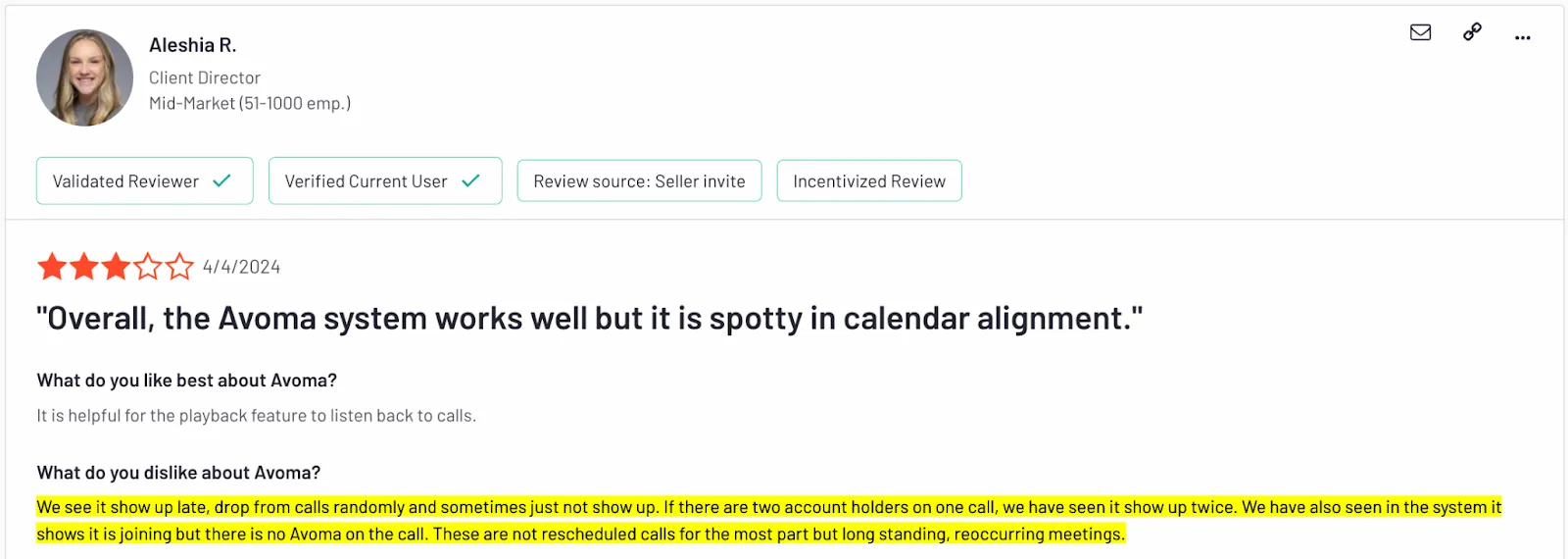
While Avoma is likely addressing these issues, usability concerns remain a common reason users start exploring alternatives.
3. Hard to Measure ROI
Every tool you use for your company has to serve a certain purpose and deliver measurable impact so you can justify its cost.
A meeting assistant tool can help you get more productive, but it can be hard to put a concrete number to this productivity boost.
If leadership can’t easily quantify the return on investment (ROI), it becomes challenging to justify Avoma’s cost, leading them to explore other alternatives that offer tangible value.
10 Avoma Alternatives for You to Consider in 2025
Depending on various use cases, we have identified four key categories for Avoma alternatives: revenue intelligence, sales coaching, small business (SMB/startup) needs, and meeting transcription or note-taking.
Next, let’s evaluate these Avoma alternatives in detail.
1. Avoma vs MeetRecord
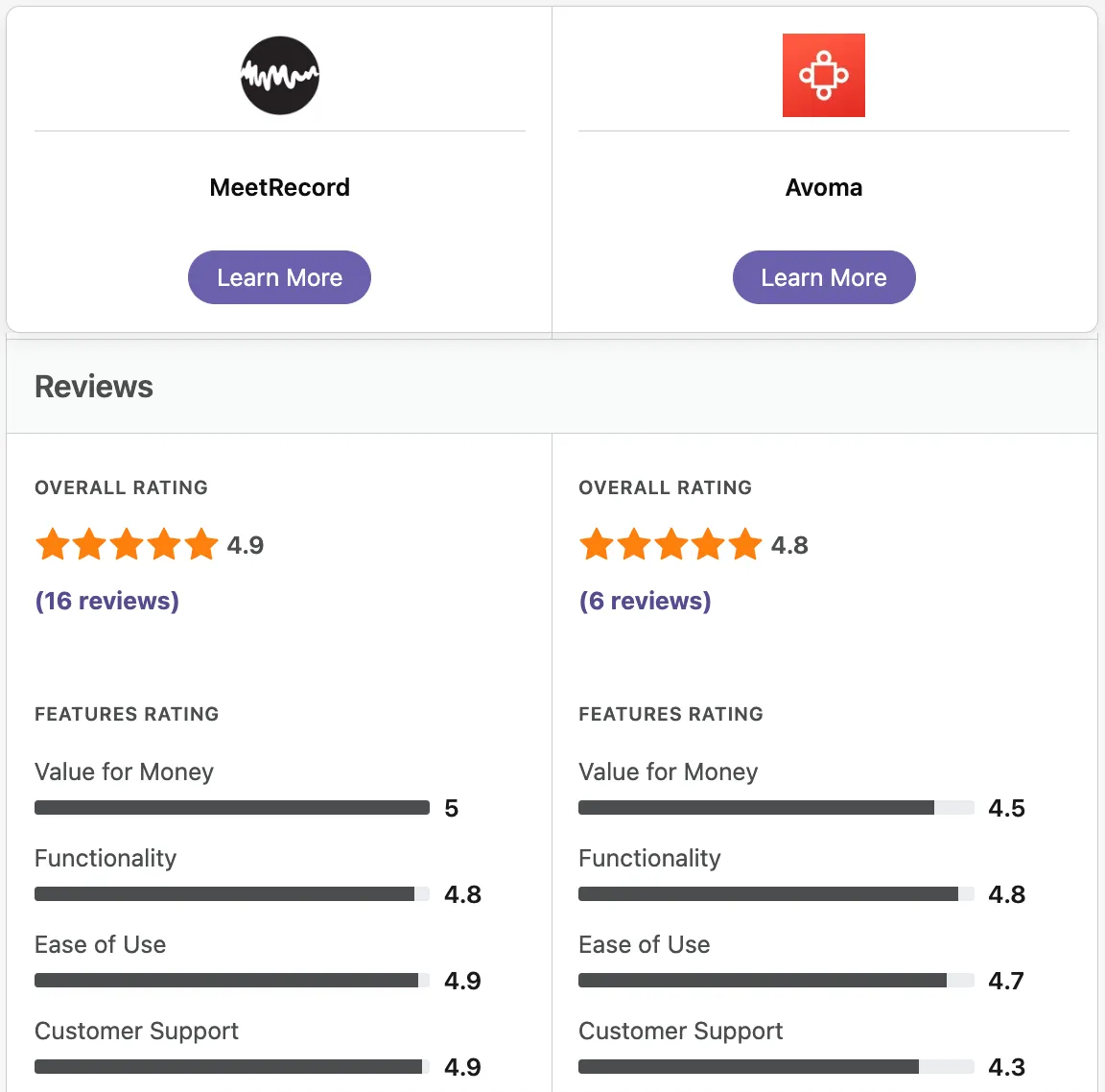
MeetRecord is a revenue AI platform built for revenue teams. It helps analyze customer conversations across calls and emails, leverage AI coaching insights, and close deals faster with adaptive deal intelligence.
Here are top reasons why you should choose MeetRecord as an Avoma alternative:
- Easy to use: Designed for busy revenue teams, MeetRecord is easy to learn and quick to start, without any complex set-up. It integrates with all major CRMs like Pipedrive, HubSpot, and Salesforce so it fits easily into a sales team’s ecosystem.
- Great support: On G2, MeetRecord is 4.6-star rated for support. This can be critical if you’re a small business or startup that needs quick turnaround times and hands-on help.
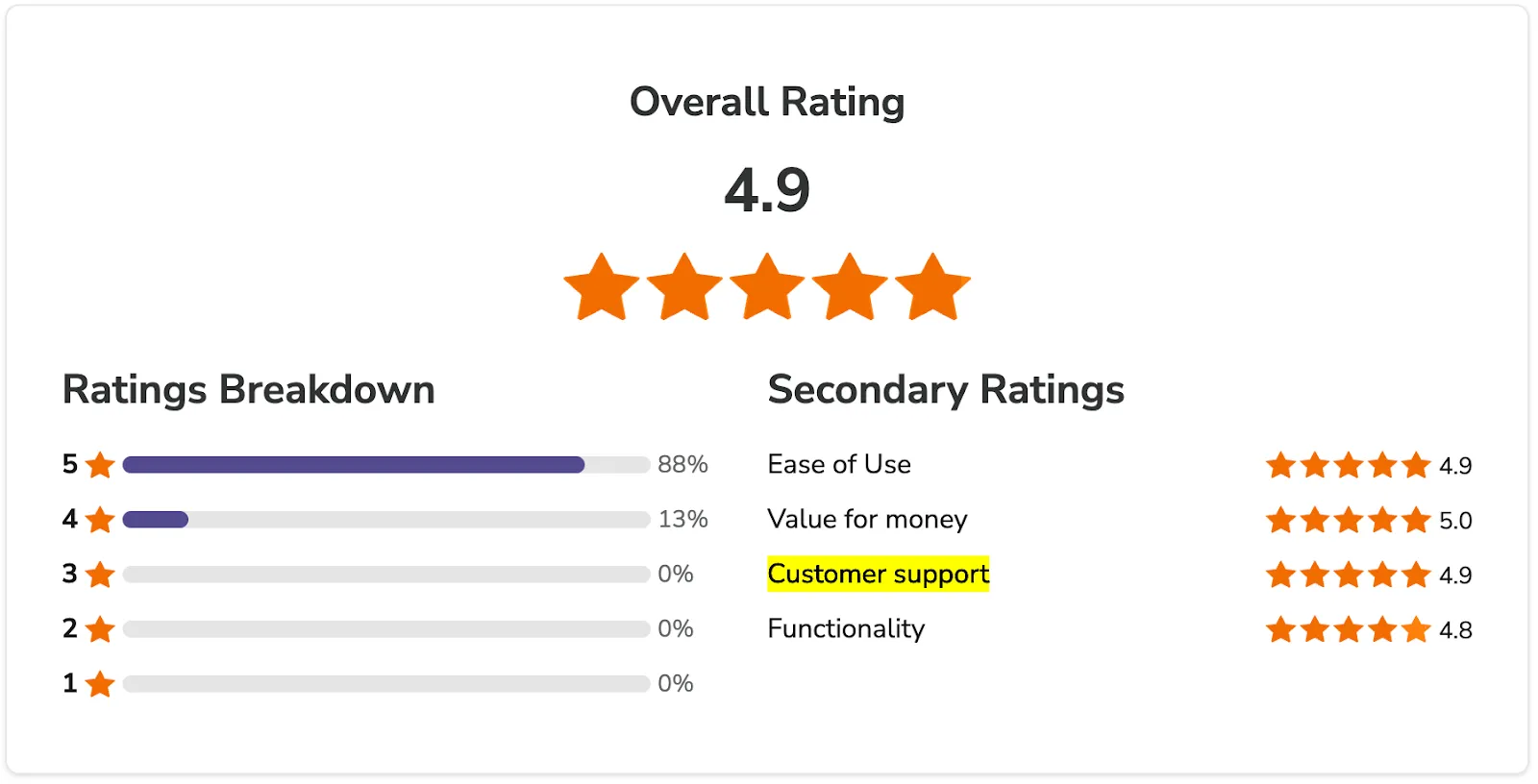
- Integrated sales coaching: MeetRecord transforms call data into actionable coaching. Sales leaders can get AI-powered scorecards, detailed feedback, and real-time insights, all in one place. This makes it easy for them to coach at scale without slowing down the team.
MeetRecord goes beyond basic call recording and transcription to analyze the winning patterns in sales conversations. This enables you to replicate the best practices across the team.
Managers can listen to calls, rate reps based on scorecards, give tailored feedback, and track performance improvements over time.
How Does MeetRecord Compare to Avoma?
MeetRecord is an enterprise-grade solution built specifically for revenue-facing teams (Sales, Customer Success, and RevOps).
It goes beyond the basic meeting assistant features that are table stakes for any revenue intelligence platform. Instead, it focuses on revenue coaching, deal intelligence, and forecasting.
MeetRecord Pricing
MeetRecord offers flexible pricing to suit individual business needs, with custom quotes based on team size and features. You can also test out its AI sales roleplay for free.
For more details, check out Meetrecord’s pricing page.
2. Avoma vs Gong
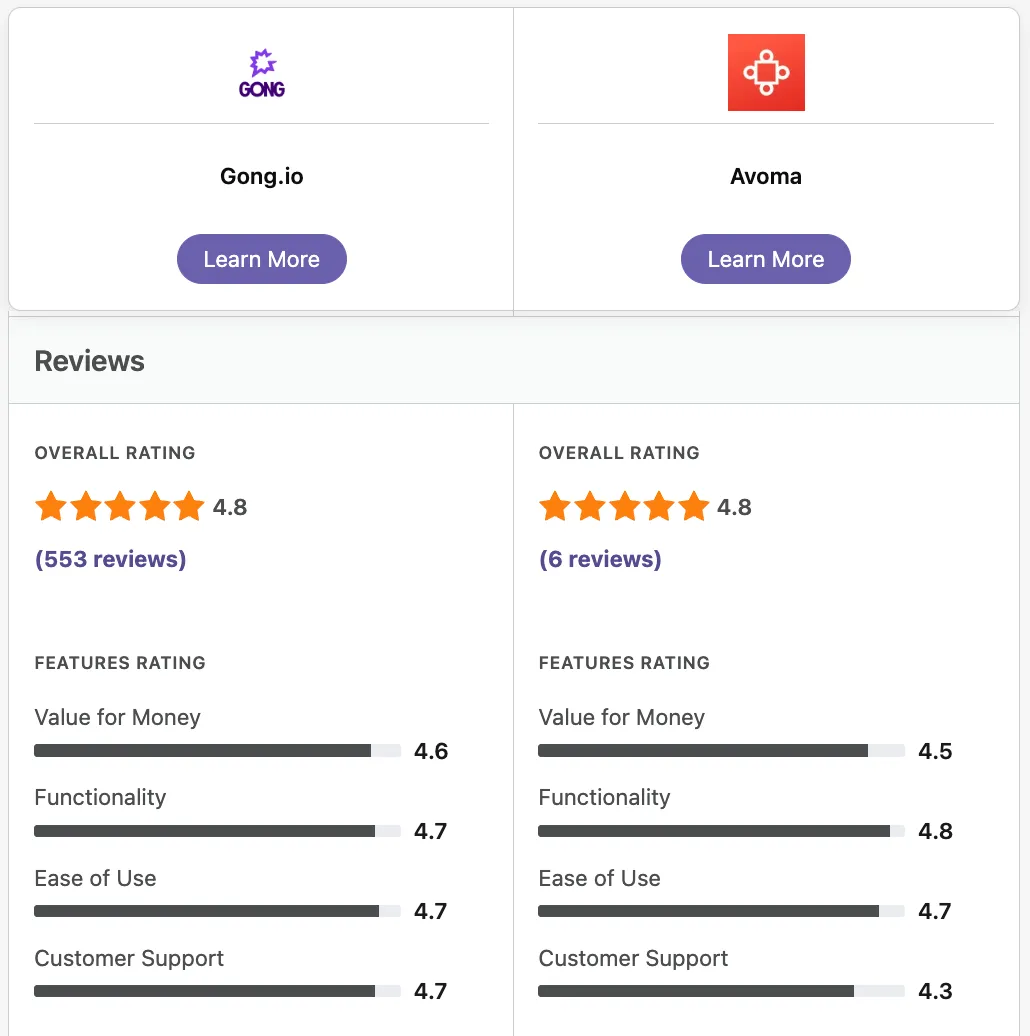
Gong is one of the best revenue intelligence platforms for sales teams that can transform conversations into data and insights. It’s widely adopted by enterprises for its robust analytics and deal insights.
How Does Gong Compare to Avoma?
Gong is a pure-play enterprise platform for scaling revenue, while Avoma is a tactical tool for improving meeting productivity.
- While Avoma focuses on meeting assistance, Gong is built for revenue intelligence.
- Tailored for large enterprises and mature sales organizations.
- Provides actionable revenue insights through advanced analytics and CRM integration.
- Excels at pipeline tracking, deal forecasting, and rep performance coaching.
- Uses AI to analyze patterns in sales conversations—far beyond simple note-taking.
Compared to Gong, Avoma is more about capturing meeting content and basic summaries, not revenue-driving insights.
Gong Pricing
Gong is known to be one of the pricier solutions in this space. Although Gong doesn’t share its pricing information publicly, our research shows that it starts from $5,000 + $1,600 per user/year (approximately). Read more about Gong’s pricing breakdown and how it stacks up against others.
Gong also requires annual contracts, has minimum seat counts, and comes with additional platform fees given its enterprise focus.
NOTE: If you're also weighing other sales tools beyond Gong or Avoma, Clari Copilot is likely on your list. Here’s a quick Gong vs Clari Copilot comparison blog to help you decide.
3. Avoma vs Chorus
Chorus by ZoomInfo is one of the top players in the conversational intelligence market. Its defining features include detailed call transcription and a robust intelligence platform.
Chorus.ai has consistently found new ways to derive deal intelligence from conversational data, keeping it competitive in the space.
How does Avoma compare to Chorus?
Here is how Avoma stacks up against Chorus by ZoomInfo:
- Chorus is not a direct Avoma alternative, but it has features including meeting recording, transcription, and AI-driven insights that can be used in place of Avoma.
- Chorus is made for mid-market and enterprise companies, whereas Avoma is built for SMBs. Avoma offers more affordable plans than Chorus.
- Feature-wise, Chorus.ai caters to larger sales teams, helping them track calls, improve rep performance, and even forecast sales outcomes using conversation data.
Chorus Pricing
Like Gong, Chorus doesn’t list its pricing information publicly. However, because it’s an enterprise product, Chorus comes with a hefty price tag.
Our research shows that Chorus costs a base fee plus $100–$200 per user per month, depending on the plan and team size.
Want to see how MeetRecord compares to Chorus? Read our full guide here.
4. Avoma vs Clari Copilot (formerly Wingman)
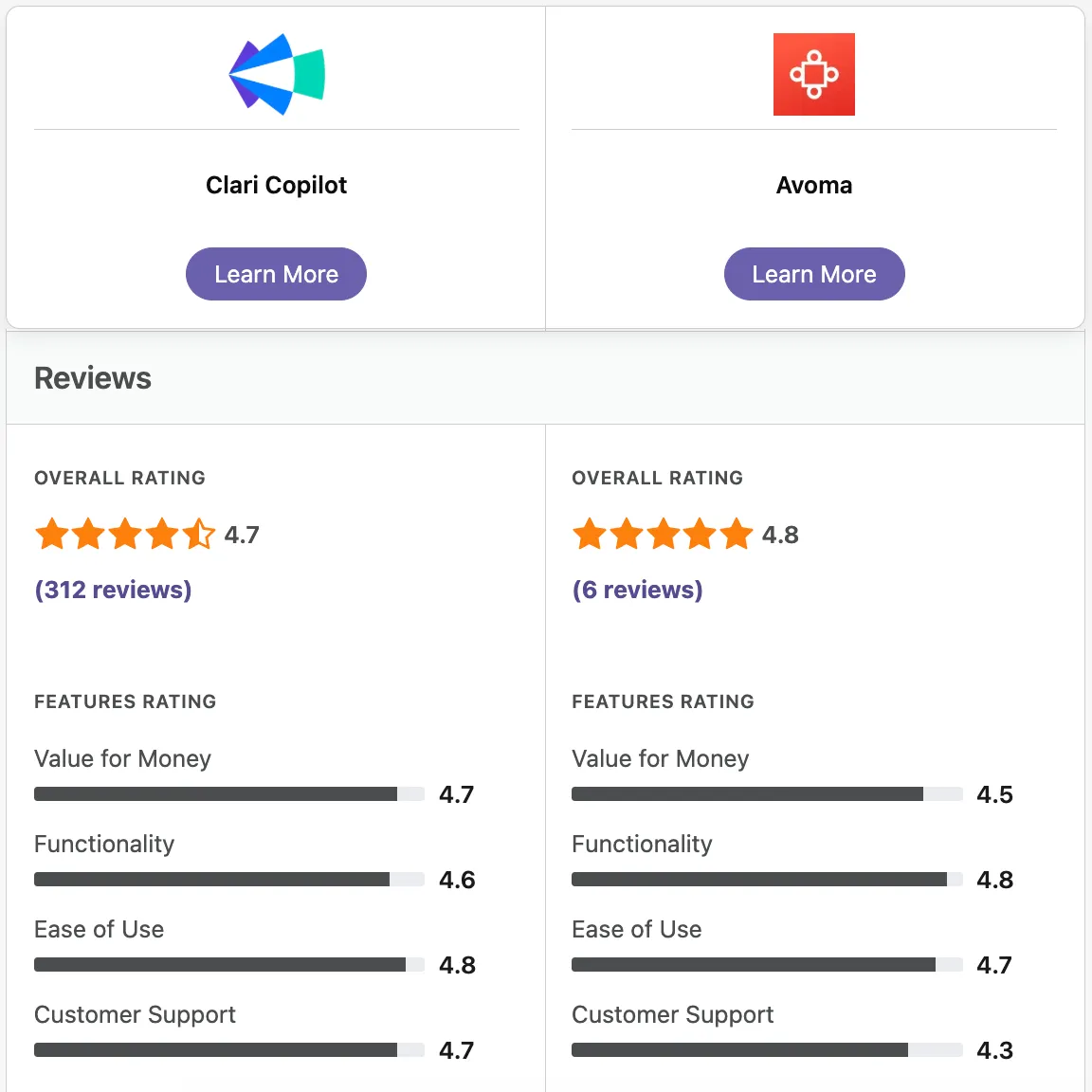
Clari acquired Wingman in 2022 and rebranded it as Clari Copilot.
It’s yet another conversation intelligence platform that helps you gather insights from all sales interactions.
Clari Copilot (formerly Wingman) automatically records and transcribes calls, provides deal reviews, and facilitates sales coaching through real-time cue cards, scorecards, and AI-driven guidance. It’s designed to help revenue teams build a scalable sales engine.
How Does Avoma Compare to Clari Copilot?
Clari Copilot is a conversation intelligence tool for SMB and mid-market sales teams, while Avoma serves more broadly as a meeting assistant.
- Clari Copilot specifically focuses on improving revenue outcomes, while Avoma focuses on improving meetings.
- Because Clari Copilot is more sales-centric, it includes many sales enablement features Avoma lacks. For example, Clari’s Live Cue Cards help reps handle objections on calls as they happen, something Avoma doesn’t offer.
- Clari also comes with a more robust call coaching workflow.
Clari Pricing
Based on our research, Clari is priced roughly between $720–$1,320 per user per year (approximately $60–$110 per user/month). The range depends on the edition and feature bundle (and as part of Clari’s platform, pricing can be customized).
5. Avoma vs Fireflies
Fireflies.ai is an AI assistant for your meetings, primarily known for recording and transcribing calls and integrating with collaboration tools.
How does Avoma compare to Fireflies?
Fireflies and Avoma entered the AI notetaking space around the same time, but their trajectories and target users have diverged significantly.
- Both tools offer meeting recording, transcription, audio uploads, and AI-generated notes.
- Avoma aims to move upmarket, targeting mid-sized enterprises. Fireflies focuses on small and medium businesses with a broader self-serve appeal.
- Fireflies.ai started as an AI notetaking tool for scrappy teams and has since become a unicorn with a $1 billion valuation.
- Avoma, despite charging nearly twice as much ($19/user/month) vs. Fireflies ($10/user/month), remains caught in its SMB appeal and upmarket dreams.
- Avoma includes lightweight coaching and customer insight features, whereas Fireflies is more focused on capturing and organizing meeting notes.
- Fireflies is occasionally critiqued for lack of transcript accuracy and upselling on storage. Avoma users more often report issues with setup and user interface.
Fireflies Pricing
Fireflies has a free plan that covers many basic needs (a big win for small teams).
Its paid plans start at $19/user/month. In general, Fireflies is one of the more affordable Avoma alternatives.
6. Avoma vs Otter.ai
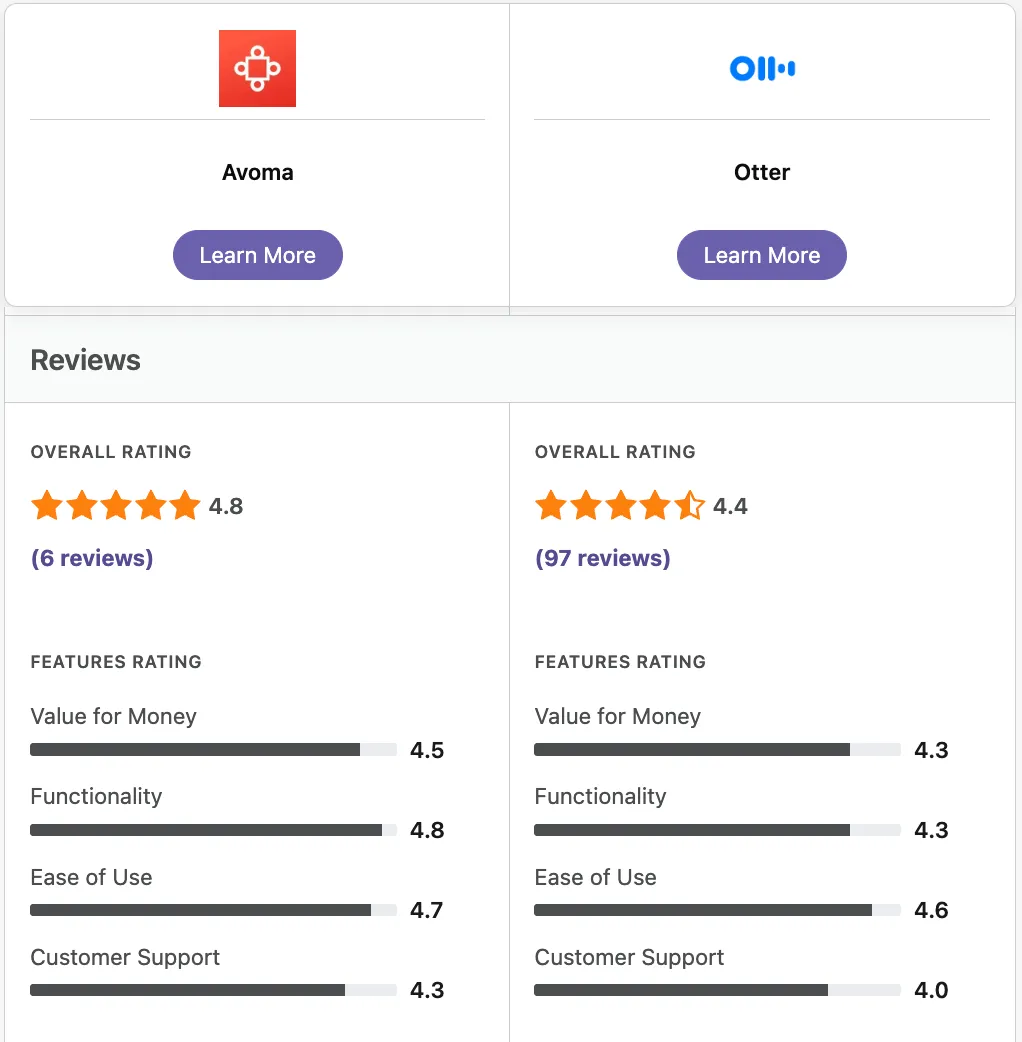
Otter.ai is a popular AI-powered speech-to-text software that creates shareable transcripts and audio recordings.
Like Avoma, Otter also offers real-time note-taking, speaker identification, slide capture, summaries, and action items.
Trusted by teams in sales, education, and business operations, it’s built to boost productivity and make meetings more productive.
How does Otter.ai compare to Avoma?
Otter.ai is built for clarity and simplicity, while Avoma aims to deliver deeper insights for revenue-focused teams. The difference lies in depth, not just features.
- Otter is primarily a transcription and note-taking tool with real-time collaboration features like live transcription, highlights, and comments.
- Avoma offers broader meeting intelligence, including analytics, coaching insights, and post-call summaries tailored for sales teams.
- Otter captures what was said. Avoma helps analyze why it matters, with features geared toward performance tracking and customer understanding.
- Otter is ideal for journalists, educators, students, and business users who need clean, searchable transcripts.
- Avoma is better suited for business teams looking for CRM integration, coaching workflows, and deal insights.
- Otter lacks conversation intelligence, pipeline analytics, and coaching tools. It falls short as a full Avoma replacement in sales environments.
Otter.ai Pricing
Otter has a generous free plan, though it’s really suitable for personal use only because of limited monthly transcription minutes. Otter’s paid plans start from $8.33/user/month.
7. Avoma vs Fellow.app
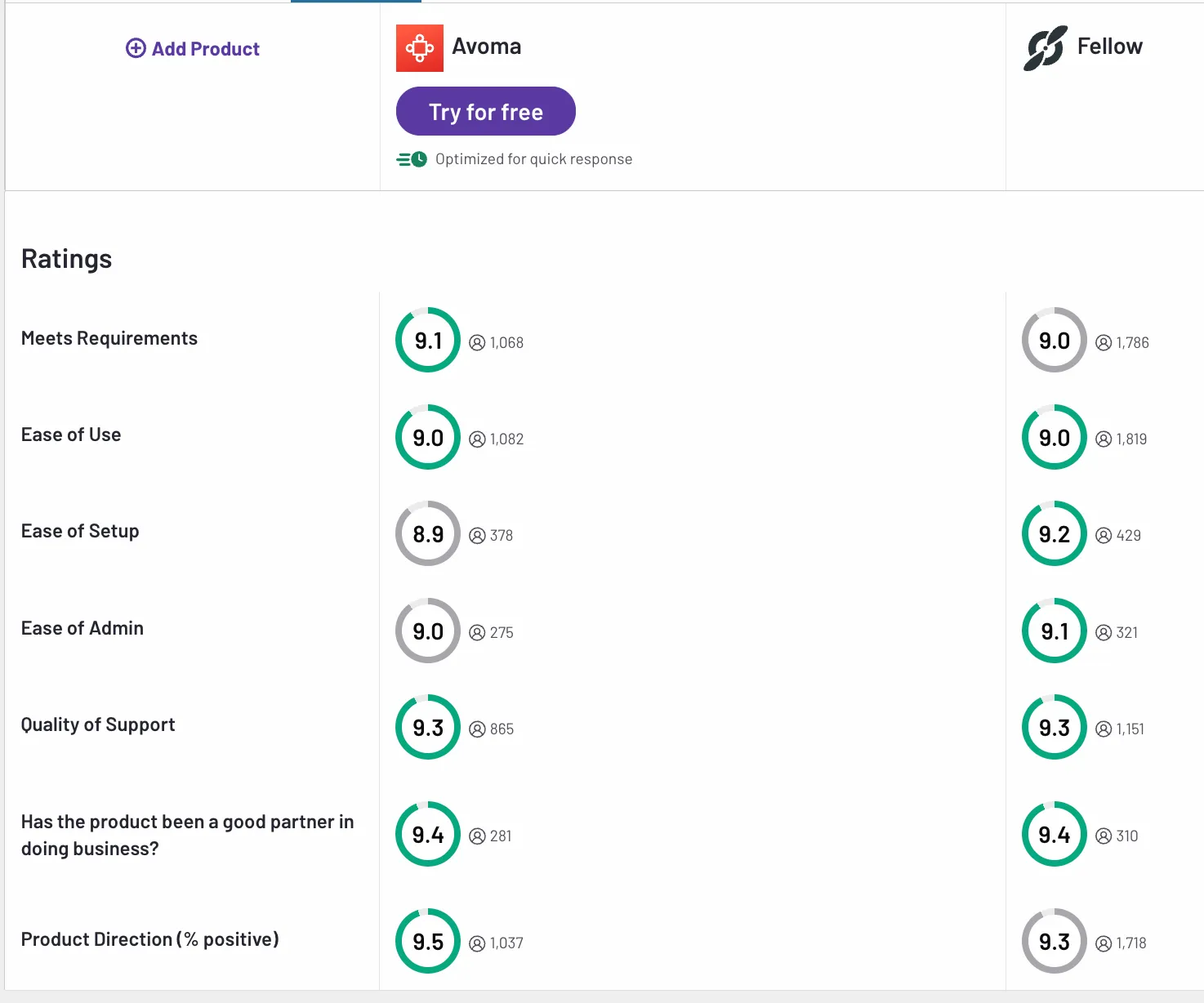
Fellow.app is a note-taking and meeting management tool that helps teams create collaborative agendas, take meeting notes, and track action items.
Unlike Avoma, which emphasizes AI-driven transcription and conversation intelligence, Fellow focuses on improving meeting organization and team collaboration.
It doesn’t natively record or analyze sales calls to the extent of Avoma. But it excels at fostering better internal meetings and accountability (for example, through shared meeting templates and action item tracking).
How does Fellow compare to Avoma?
Fellow and Avoma serve different purposes—Fellow focuses on internal meeting productivity, while Avoma leans into intelligence for customer-facing conversations.
- Fellow is built for managing meeting agendas, notes, and action items. It’s ideal for team leads, managers, and cross-functional collaboration.
- Avoma supports sales and customer success teams with call recording, AI summaries, and post-call insights.
- Fellow recently introduced AI-powered transcription in its premium plans, but with limited transcription minutes and recording capacity.
- Avoma offers robust transcription and recording tools as part of a broader conversation intelligence stack.
- Fellow lacks coaching workflows, deal intelligence, and CRM integrations (key features for revenue teams).
- Avoma includes tools for analyzing customer conversations and improving team performance at scale.
- Choose Fellow if your goal is better internal meeting structure and team accountability.
- Choose Avoma if you need AI-powered insights from external, customer-facing calls.
Fellow.app Pricing
Fellow offers a free tier for basic meeting management. Paid plans start at around $7 per user/month.
8. Avoma vs Chorus.ai (ZoomInfo Chorus)
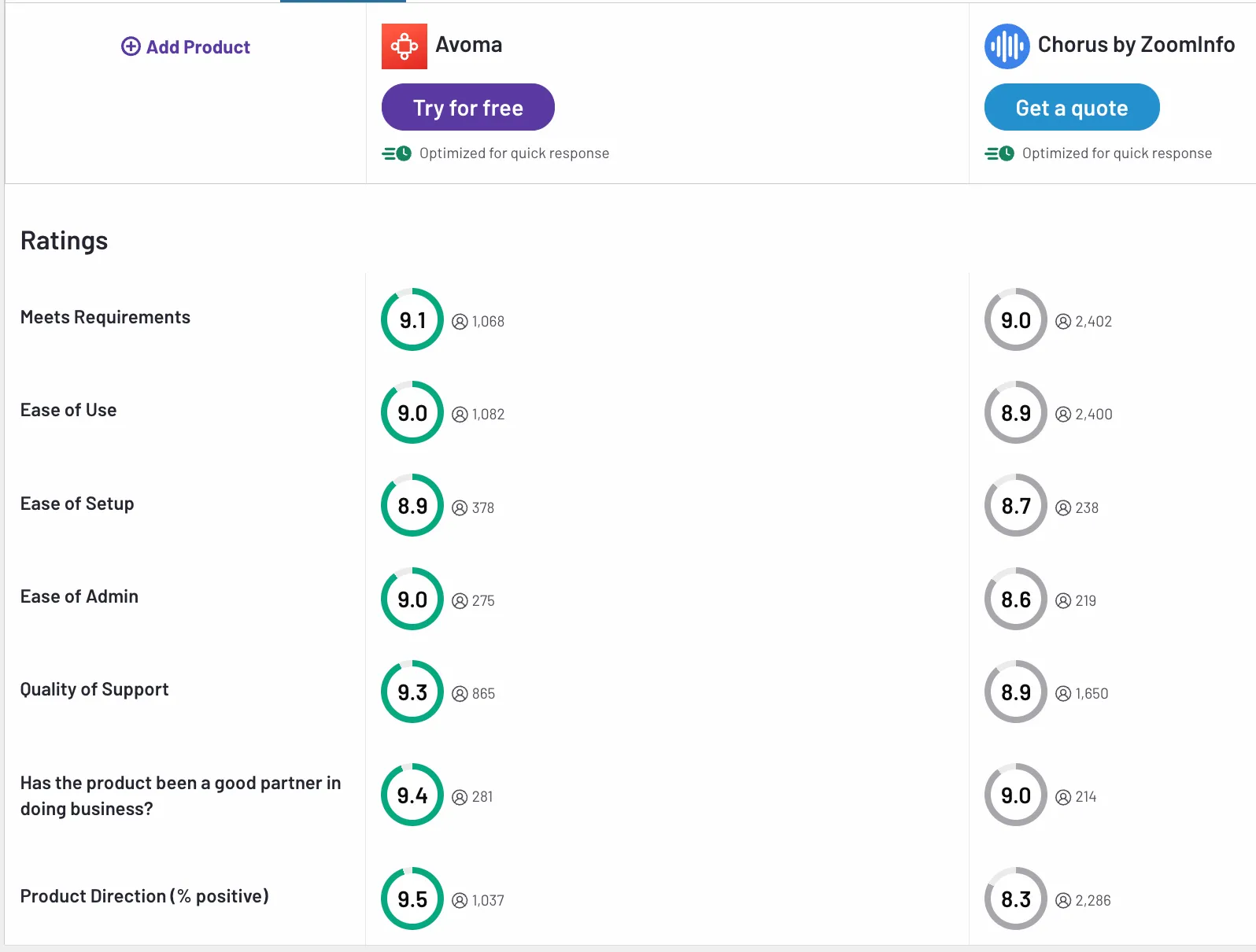
Chorus.ai, now part of ZoomInfo, is a leading conversation intelligence platform for sales organizations. It records and transcribes calls and uses AI to derive detailed deal intelligence and coaching insights from those conversations.
Being owned by ZoomInfo also means Chorus can integrate with a vast B2B contact database, enriching call data with firmographic details for deeper insights.
How does Chorus compare to Avoma?
Both platforms offer meeting recording, transcription, and insights, but there are key differences:
- Chorus’s feature set is geared toward enterprise sales teams that need advanced conversation analytics across many reps and deals.
- Chorus excels at pipeline-centric insights (e.g. detecting deal risks and buyer sentiments) and complex sales coaching workflows. Avoma doesn’t extend as far into pipeline analytics or deal tracking.
- Chorus offers deeper sales enablement features. For example, it can track commitment phrases, competitor mentions, and other deal signals in calls to help managers forecast and coach reps. It also includes robust coaching dashboards and integration with ZoomInfo’s database for enriching contact info.
- Avoma’s strength is simplicity: it’s easy for anyone to use as a smart note-taker, whereas Chorus’s strength is its breadth of sales-specific analytics (but with higher complexity).
- Chorus can be complex to implement and learn. It might overwhelm a 10-person startup sales team, but Avoma would fit them well.
- Chorus (via ZoomInfo) places a heavier emphasis on CRM data integration to fuel its revenue intelligence features. Avoma integrates with CRMs primarily to log meetings and notes; its integrations are lighter-weight compared to Chorus.
Chorus Pricing
Chorus’s pricing is not publicly disclosed, but from our research, we know it typically starts at $8,000 for a base license, plus $1,200/user/year for each additional seat.
There’s no free plan, but enterprise buyers can request a demo or trial through the ZoomInfo sales team.
Avoma (or another lighter-weight alternative) can cover the essentials at a fraction of the cost.
9. Avoma vs Jiminny
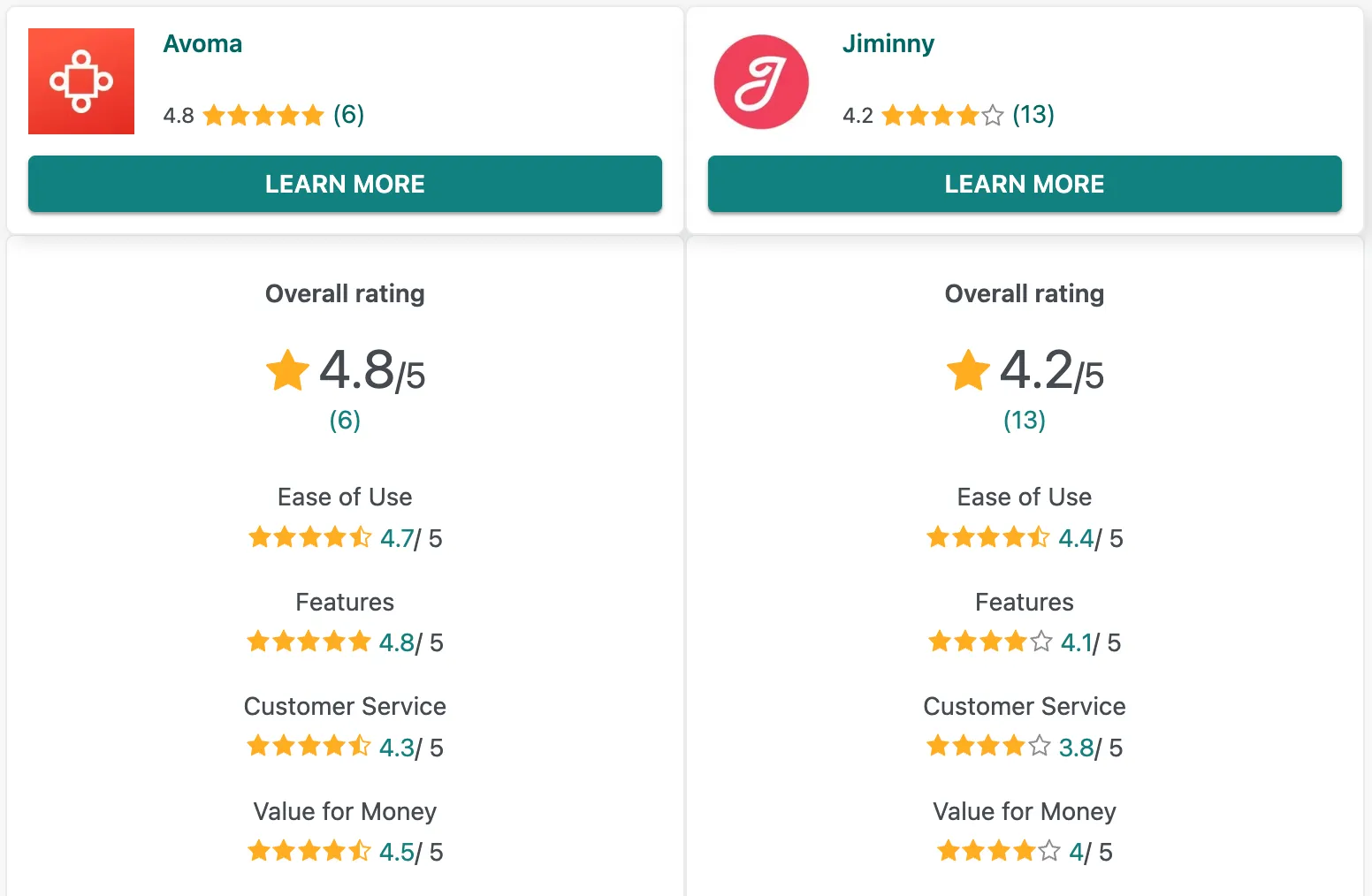
Jiminny is an AI-powered conversation and revenue intelligence platform designed to help sales teams boost their performance through insights from calls and meetings.
The platform offers features like trend analysis on keywords/topics, “deal intelligence” alerts for at-risk deals, and AI-driven coaching feedback to reps.
How does Jiminny compare to Avoma?
While Avoma and Jiminny both record and transcribe meetings, Jiminny is more singularly focused on sales performance and revenue outcomes. Here are the key comparisons:
- Jiminny is first and foremost a sales tool – everything it does is about improving sales conversations and pipeline management.
- Avoma, in contrast, is a general meeting assistant. It’s great at meeting management, but it doesn’t go as deeply into sales-specific analytics.
- One of Jiminny’s key highlights is its AI coaching module that offers real-time feedback or post-call coaching tips based on what was said in a sales call.
- Avoma’s feature set is broader in user base, but narrower in depth.
- If you need things like multi-call deal analytics or AI-driven sales coaching at scale, Jiminny has the edge.
- Jiminny is appealing to mid-market and enterprise sales teams that want to build a data-driven coaching culture. Avoma is attractive for small to mid-size businesses that want an affordable way to record calls and share meeting notes across teams.
Jiminny Pricing
Jiminny’s pricing information isn’t listed on its website. Unlike Avoma, Jiminny doesn’t offer a free plan or even a free trial for new users. Our estimate is that Jiminny costs around $85/user/month.
10. Avoma vs Enthu.AI
Enthu.AI helps sales teams monitor their customer calls and derive actionable intelligence to improve outcomes. It’s a quality management and coaching tool for call-heavy teams.
Its key features include sentiment analysis of conversations, AI-generated call summaries, keyword spotting, and alerting on specific call events. Enthu.AI makes it easy to coach teams at scale by using AI to share what managers need to know.
How does Enthu.AI compare to Avoma?
Enthu.AI and Avoma have some overlapping capabilities, but their focus differs significantly:
- Enthu.AI is purpose-built for conversation quality assurance (QA) and coaching. Avoma provides meeting insights, but it lacks the formal QA scoring and coaching workflows that Enthu offers.
- Enthu.AI supports hierarchical team setups, multiple departments, and even cal monitoring for different clients/projects. Avoma is typically for smaller sales teams.
- Enthu has built-in sentiment analysis, PII redaction, and a “playback library” feature. Avoma’s feature set is more straightforward: record, transcribe, summarize, and integrate notes with your tools.
- Enthu has better customer support. Avoma offers a self-serve onboarding – sign up and start recording meetings within minutes. Both are user-friendly in their interface, but Avoma’s simplicity beats Enthu’s.
Enthu.AI Pricing
Enthu doesn’t list its pricing publicly. Our findings place Enthu.AI’s starting plan at $59/agent/month (for up to 25 agents). Enthu.AI provides a 14-day free trial without credit card commitment.
Which Avoma Alternative Is Right for You?
Choosing an alternative to Avoma means finding a tool that aligns with your team’s goals, size, and budget. Here’s how to think through the decision:
1. If you need an enterprise-grade conversation intelligence solution:
- Gong.io and MeetRecord are the best solutions. Gong.io is an established brand, while MeetRecord's AI-first capabilities give you a tech edge with more coaching features.
2. If you want a specialized and budget-friendly solution for sales conversation intelligence:
- MeetRecord is your best bet if you want a high-quality conversation intelligence tool but need the features at a more affordable price.
- It offers robust features around people and deal intelligence (analytics on reps and pipeline).
- It comes with custom, flexible pricing that’s based on a team’s unique requirements.
3. If you are a startup or growing company:
- Conversation intelligence and sales coaching are essential for sales teams in this category. Clari Copilot (Wingman) is a great fit here.
4. If you are looking for a dedicated meeting assistant or only need recording and transcriptions:
- Fireflies is the closest to Avoma if you need a budget-friendly alternative for a meeting assistant tool. It will record and transcribe meetings effectively without a big price tag.
- Otter is your best bet if you truly only need transcription and basic notes, with no extra analytics. It’s cheap (or free) and easy for that singular purpose.
In summary, Avoma is a strong meeting assistant, but depending on your specific needs, one of the alternatives above may serve you even better.
MeetRecord: An Avoma Alternative for Fast-Growing Teams
When you compare the features, flexibility, and pricing that MeetRecord provides, it emerges as the strongest competition.
Its focus on revenue intelligence features with AI-powered sales coaching and adaptive deal intelligence makes MeetRecord a powerful choice for sales teams.
Want to turn your sales conversations into real revenue insights? Book a demo with MeetRecord and see why it outperforms Avoma.


.svg)

.webp)

